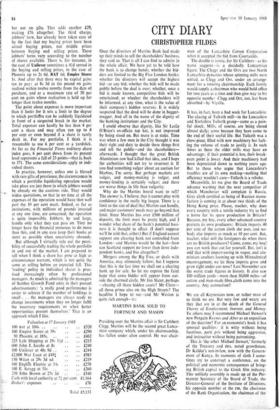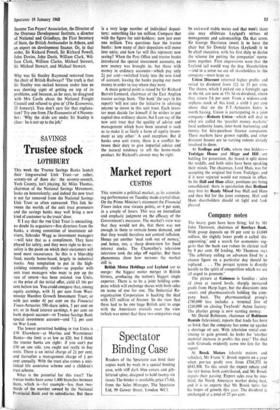CITY DIARY CHRISTOPHER FILDES .
I could observe that dignity, like Sir Leslie O'Brien's ex-officio top hat, is not improved by being stood on. But more is at stake. Time was when a few men in the City thought it was their right and duty to decide these things first and tell the public—and the shareholders— afterwards. I thought that the great British Aluminium row had killed that idea, and I hope the authorities will not try to resurrect it. If you find something vulgar about an auction for Martins, I'm sorry. But perhaps markets are vulgar, and money-making is vulgar, and money-lending is certainly vulgar; and there are worse things in life than vulgarity.
Why do the Martins board want to sell? The answer is, I believe, that it cannot play with confidence in the really big league. There is a limit to the size of deal that Martins can handle, and major customers' needs may go beyond that limit. Since Martins has over £500 million of deposits, the limit must be pretty high, and I wonder what share of the bank's potential busi- ness it is thought to affect. (I don't suppose we'll be told that, either.) But if England cannot support one clearing bank not controlled from London—and Martins would be the last—how can Scotland support no fewer than three inde- pendent banks, and five altogether?
Mergers among the Big Five, or deals with America, may ultimately follow; but I suppose that this is the last time we shall see a clearing bank up for sale. So let me express the faint hope that some bidder will appear from out- side the charmed circle. Mr Jim Slater, perhaps —chasing all those hidden assets? Mr Clore— all those prime sites on the High Streets? The headline I hope to see—and Mr Weston is quite rich enough—is : MARTINS- BANK SOLD TO FORTNUM AND MASON Presiding over the Martins affair is Sir Cuthbert. Clegg. Martins will be the second great Lanca- shire company which, under his chairmanship, has fallen under alien control. He was- chair- man of the Lancashire Cotton Corporation when it accepted the bid from Courtaulds.
The double is ironic, for Sir Cuthbert—as his name suggests—is a decidedly Lancastrian figure. The Cleggs and the Orrs are two North Lancashire dynasties whose spinning mills were united, as Clegg and Orr, under an arrange- ment for a rotating chairmanship. Each family would supply a chairman who would hold office for two years at a time and then give way to his opposite number Clegg and Orr, too, has been absorbed—by Viyella.
It has, in fact, been a bad week for Lancashire. The closing of Tulketh mill—in the Lancashire and Yorkshire Tulketh group—came as a pain- ful shock. Mills, of course, are being closed almost daily; some because they have come to the end of their useful life. But Tulketh was a show-piece, filled with new machinery but lack- ing the volume of trade to justify it. In such times as these the older mills may have an advantage: if their potential is less, their break- even point is lower. And their machinery had been depreciated down to nothing years ago. But to those who argue that Lancashire's troubles are of its own making—nothing that efficiency wouldn't cure—Tulketh is a rebuke.
Meanwhile, let me give the Board of Trade advance warning that the next competitor of which Manchester will complain is Russia. Grey cloth certified as being of Russian manu- facture is coming in at about two thirds of the Hong Kong price. Please, teacher, why does every country with a textile industry try to find a home for its spare production in Britain? Because, my boy, every other advanced country protects its own producers: Britain imports 40 per cent of the cotton cloth she uses, and no- body else imports as much as 10 percent. But, teacher, what will the foreigners do when there are no British producers? Come, come, my boy` you can work that out for yourself. But, isn't it odd that with import-saving in vogue, and alu- minium smelters looming up with Mintechnical encouragement, we let these imports grow and grow right under our nose? Last November saw the worst trade figures in history. It also saw 100 million yards—more than 50,000 miles—of cotton and man-made fibre .cloth come into the country. Any connection?
We are all Keynesians now, or rather most of us think we are. But very few and weary are they that are in at the death of the General Theory of Employment, Interest, and Money., To others may I recommend Michael Stewart's new Penguin Keynes and After as an exposition of the doctrine? For an economist's book it has unusual qualities: it is witty without being facetious, parti pris without being aggressive, and instructive without being patronising.
This is 'the other Michael Stewart,' formerly of the Treasury and DEA, noted growthman, Dr Kaldor's son-in-law, now with the Govern- ment of Kenya. In moments of sloth I some- times try to construct a conference, on the political and economic consequences of bring-, ing British. capital to the Greek film industry. This unlikely assembly is made up of the Per- manent Secretary of the Board of Trade, the Director-General of the Institute of Directors,- his opposite number at the cm, the chairman of the Rank Organisation, the chairman of the
Income Tax Payers' Association, the Director of the Overseas Development Institute, a director of National and Grindlays, the First Secretary of State, the British Ambassador in Athens, and an expert on development finance. Or, in that order, Sir Richard Powell, Sir Richard Powell, John Davies, John Davis, William Clark, Wil- liam Clark, William Clarke, Michael Stewart, Sir Michael Stewart, and Michael Stewart.
Why was Sir Stanley Raymond removed from the chair of British Railways? The truth is that Sir Stanley was sacked because, under him BR was showing signs of getting on top of its problems, and because, as.he says, he-disagreed with Mrs Castle about the National Freight Council and refused to give in' (The Economist, 13 January). You don't care for that explana- tion? Try one from The Economist of 4 Novem- ber: -Why the skids are under Sir Stanley is clear : he is not up to the job.'



































 Previous page
Previous page